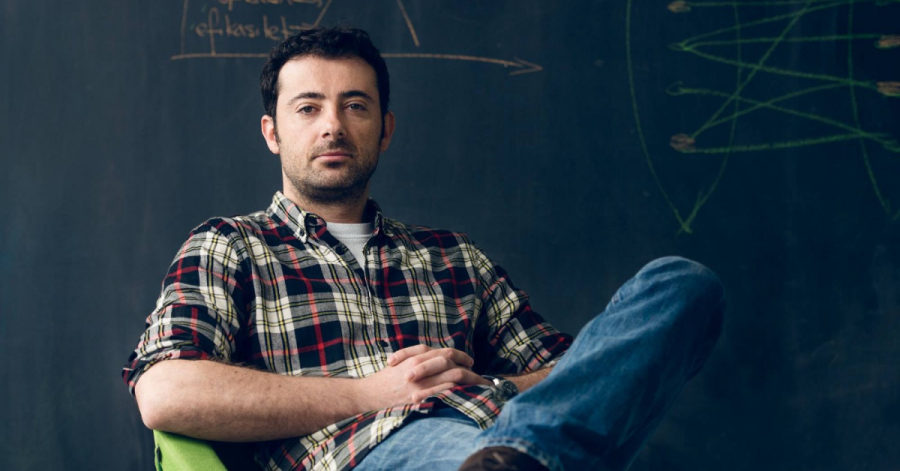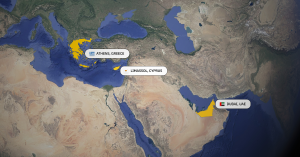Entrepreneurs have a nose for untapped opportunities and unrealized market potential. Some of them are driven by the rate of return. While others discover underdogs. Mergim Cahani, the founder and CEO of the Albanian-Kosovan e-commerce and search engine company Gjirafa is the second kind.
Cahani walked a long road until he became the founder of the fastest-growing company in the Western Balkans. The Recursive met him during Wolves Summit 2022, where he participated in a panel discussion about the growing potential of regional tech talent. From first sight, he strikes as a value-driven founder with a truly entrepreneurial DNA. He traded a high-income career in the UN for getting a tech education, built a career in product management, and then traded his American dream lifestyle to start a company in Kosovo.
In this conversation about business and success, Cahani shares how he created Girafa and turned it into a fast-scaling business. But also what it is like to have a “David and Goliath” founder mindset.
Building a career in tech as a refugee
Born in Kosovo, Cahani had the rare chance to own a personal computer at a very young age. By the time he was 13, he was already able to write code and this lit the match for his lifelong passion for technology. Even the turbulent political times did not prevent him from following his passion/ and in 1999, when the peak of the Kosovo war happened, he started working for the United Nations as a refugee in neighboring Albania. It was then when he was at a crossroads for the first time in his life.
“I had to decide whether to go somewhere and earn money or invest money in my education. The UN offered me to go on an international mission in Congo, where I would have a high-income salary and a blue passport. On the other hand, I had the choice to apply to a university in New York,” Cahani remembers.
He chose the challenging path and went to New York in 2002.
“I arrived at JFK airport on January 5th, at 5 PM. My journey in the city of New York lasted for almost 11 years. I finished my Bachelor’s degree in Computer Science, did a Master’s in Computer Science at New York University, and finished an MBA at St. John’s. The hook that had an impact on me, was that I did my Masters with a professor that was one of the top published researchers in academia for search engines. He was a principal researcher at Yahoo when Yahoo was big and together with him, I did a search engine project. This was my first exposure to this kind of technology and I thought I could do it for my region,” he shares.
But he ended up building a career in corporate America. At that point, again, he was faced with a tough decision. Either to continue his American dream life and keep his well-paying job, beautiful car, beautiful house, and comfortable life or to start something new at home from scratch. Back then he had already founded some companies in the US as well. Some of them failed, and one exited, but nevertheless, he could have continued his entrepreneurial journey anywhere in Europe.
“I wanted to do something for the region, but my idea just seemed highly improbable. I picked the challenging path, just like I initially picked to go to NY and study instead of the easy way out. There is a quote by Confucius that best describes this. It says ‘everybody has two lives, and the second one begins when you realize you have one’. If you look at it even deeper ideologically and philosophically, it is more about the passion for underdog opportunities. About doing the thing that is almost impossible to do,” Cahani explains.
Back then no company from the Western Balkans- Kosovo, Albania, or North Macedonia, had ever raised substantial startup venture capital. He says that even the goal of Gjirafa to make an IPO is also improbable. No company from the Western Balkans has yet made it to a global stock exchange.
“Having this type of ambition either makes us too crazy or gives us the opportunity to do something that hasn’t been done before. I remember that even as a kid when I was watching two sports teams, I would cheer for the one that was losing the game. If I were independent, of course,” he jokes. “This David and Goliath type of mindset has been very impactful on my future endeavors as an entrepreneur,” Cahani concludes.
The Albanian Amazon
Mergim Cahani explains that in the 2010s, the market was still virgin and fragmented. Kosovo was and still is the only country in Europe which requires its citizens to have a visa to travel to Europe. The movement of goods in the other countries in the region – Bosnia, Serbia, North Macedonia, and Montenegro, is also constrained because of the hard borders, different legislation systems, and different legal requirements. More importantly, no Western tech company was willing to allocate resources to service these smaller markets.
“It all started as an opportunity because nobody was stepping into this market, but with time, this opportunity has grown into a responsibility. Because if we [people from the region] don’t do it, others won’t do it for us. If we don’t create what Gjirafa delivers in Kosovo, Albania, North Macedonia, and eventually Serbia, or Bulgaria, nobody else will. Sometimes, I think that I can’t quit even if I want to, this is a responsibility that we feel about our mission,” Cahani says.
Gjirafa was launched in 2013 to fill in this gap and build the first Albanian search engine that provides Albanian speakers with a full suite of internet services in their native tongue. The company started out with the mission to digitize the country’s information and grow the internet economy of the Balkans. They did it by digitizing and indexing all types of information in Albania and Kosovo to offer search but quickly moved into e-commerce and online advertising solutions.
Cahani bootstrapped the initial development of the company. He used the money from his pension plan and sold all of his assets in the US besides his books which he brought back home. After receiving some financial backing from friends and family, Cahani applied to the StartupYard accelerator which gave Gjirafa the needed boost. For less than 10 years, Gjirafa managed to build an ecosystem of services including e-commerce, video streaming, online marketing, cloud computing, and entertainment production.
Now, Gjirafa is dubbed the fastest-growing company in the region and grew almost 9,000% in revenue from 2016 to the end of 2021. The “Albanian Amazon ” has raised nearly $10M from the Czech Rockaway Capital, and prominent digital economy angel investors such as the Swiss-American investor Esther Dyson, a former managing director of JP Morgan, a former managing director of TechStars Boston, and Ondrej Bartos, General Partner at Credo Ventures. The company has more than 300 employees and it is looking into a new round.
“In order for any business to grow and be sustainable in the long-term, it needs to solve a problem. Fundamentally, one grows and becomes big by solving a societal problem and improving the life quality of people. In the short term, one might be focused on various market-driven projects, but the long-term vision should always revolve around societal problems,” Cahani concludes.







